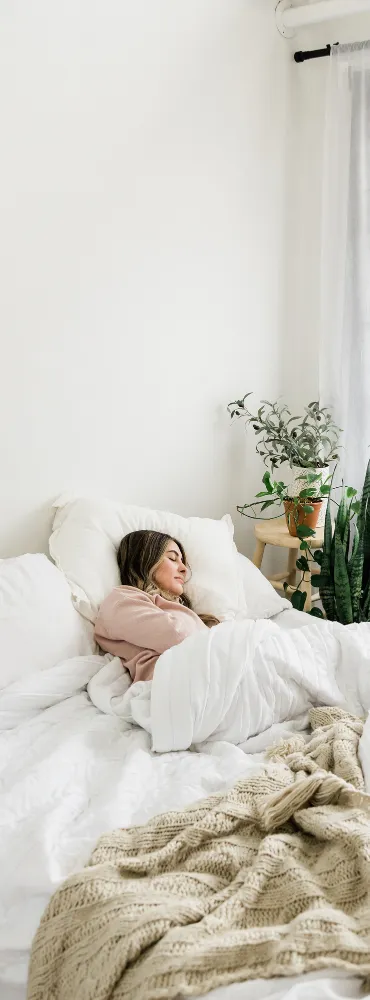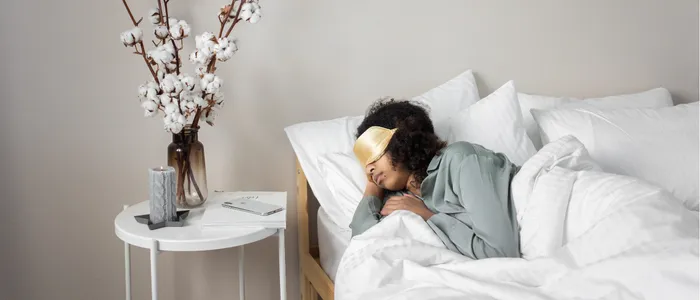Optimizing Sleep for Better Health
May 28, 2025
Sign up to receive regular emails like this
Get regular emails from Dr. Connie Hutchins filled with expert tips on injury prevention, movement, and overall health.


Sleep is often undervalued in our busy lives, but its importance to overall health cannot be overstated. Quality sleep plays a critical role in physical recovery, cognitive function, immune support, and even emotional regulation.
In my own life I've seen a huge improvement in how quickly I recover from training and how much less fatigued I feel when I really get my sleep dialed in. This plus the research data on the impact of sleep is why we make sure that this topic is something we review with every one of our patients.
Here, we’ll explore the latest research on sleep and provide practical tips to help you get the most out of your nightly rest.
The Science of Sleep: Why It Matters
Sleep isn’t just a time for rest—it’s when your body does its most essential repair work. During sleep, your body repairs muscle tissue, strengthens the immune system, and consolidates memories. Good sleep contributes to the regulation of hormones like cortisol and growth hormone, both of which play significant roles in physical recovery, stress management, and muscle growth.
Recent studies have shown that insufficient sleep can increase the risk of chronic conditions such as heart disease, diabetes, and obesity. In fact, sleep deprivation is linked to increased levels of inflammation, impaired cognitive function, and weakened immune defenses.
A study by Spiegel et al in 1999 found that restricting sleep to 4 hours/night for 6 nights in young, healthy individuals led to levels of glucose tolerance and insulin response similar to those of type 2 diabetics!
How Much Sleep Do You Really Need?
The National Sleep Foundation recommends that adults get between 7-9 hours of sleep per night. However, individual needs can vary. Some people may feel fully rested with just 6 hours, while others may need 10 hours for optimal health. Listen to your body and adjust your sleep schedule accordingly.
Sleep Quality Over Quantity
It’s not just about the number of hours you sleep but also the quality of that sleep. The key stages of sleep—deep sleep (slow-wave sleep) and REM (rapid eye movement) sleep—are essential for physical recovery, memory consolidation, and emotional regulation. Poor sleep quality can lead to frequent awakenings, difficulty falling asleep, and reduced time spent in these restorative sleep stages.
Tips for Improving Sleep Quality
I like to break this down into what you can do in the morning, middle of the day, and evening to help your sleep. Think of each of these suggestions as different lever that you can pull to adjust your sleep. Start with one or two levers that are easy for you to adjust to get quick wins. Then if you're looking for more improvements pick another one or two things to adjust.
Morning 🌤️
See the light: Light viewing (looking in the direction of the sun) for ~5 minutes, within the first 30-60 minute of waking up will help to get your body's internal clock set so that you'll be more successful at going to sleep 16 hours later.
Get moving: Exercise in the morning can raise you core body temperature which also helps to set your internal clock.
Coffee & tea timing: Try to wait ~90-120 minutes after waking to get that caffeine in. Many of us love a morning cup of tea or coffee but your body is still flushing out molecules (Adenosine) that can make you sleepy. Caffeine blocks the Adenosine from acting on your brain temporarily but can lead to it hitting you harder once the caffeine clears out (mid-day). Let your body finish its work of flushing out that Adenosine in the morning to avoid a crash later.
Timing is key: Having a consistent wake & sleep time (even on weekends) keeps your circadian rhythm (your body's internal clock) regulated. There are a lot of hormones at work to make us either awake and asleep and the body finds a rhythm of sleep and wake. The more consistent your rhythm, the easier it is for your body to go with the flow.
Mid-Day☀️
Caffeine: Make sure to get your last caffeine in earlier than you might think. Some people clear caffeine more quickly than others, but as a rule of thumb try to consume your last bit of caffeine by 2pm so that your body has time to clear it out of your system before you're hitting bed time.
Get moving: If you didn't get your main workout in the morning then aim to get a lunch time or early afternoon session in. Try to avoid vigorous exercise right before bed time so that your core body temperature and heart rate aren't elevated when you're trying to get to sleep.
Napping: While a short nap is ok (~20 minutes), a longer nap can squash the concentration of molecule Adenosine that makes you feel sleepy later. Do not exceed a 90 minute nap!
Evening 🌙
In the evening, avoid things that will interfere with you getting to sleep.
Heavy meals: Here's where having a lighter dinner (or an early dinner) so that your body isn't doing a lot of digestive work as you're trying to get to sleep can be really helpful.
Alcohol & caffeine: While alcohol may help some people feel like they get to sleep easier, it can often lead to sleep disturbances in the middle of the night, causing your sleep quality to suffer and leave you feeling fatigued in the morning. Even taking in more water and electrolytes, which can help offset some of those hangover symptoms, won't take away the negative impact of alcohol on your sleep quality. For good sleep, stop drinking 3-4 hours before going to sleep and limit intake to 1 drink or less.
Sleep-friendly environment: Keep your bedroom cool, dark, and quiet. Avoid blue light exposure from screens for at least 30-60 minutes before bed. This will also keep you from doom scrolling when you're already fatigued.
Gentle pre-sleep stretch or yoga routine: Tightness from the day can make it uncomfortable to lay down at night. I see this a lot with my patients experiencing lower back, shoulder, or neck tightness and pain. Taking 5-10 minutes to get some gentle movements in can prepare your body for a comfortable night and help you wind-down. Plus a consistent routine helps your body anticipate that sleep is coming next. Some people also lump journaling or meditation into their pre-bed routine as a calming activity.
Timing & routine: Keeping the same bed time and routine helps your body fall into the natural rhythm of sleep.
And Don't Forget... Stress & Anxiety Also Play a Role
Stress is one of the biggest sleep disruptors. Practicing mindfulness, meditation, deep breathing exercises, or even some light yoga can help calm your mind and prepare your body for sleep. We all face stressful situations and learning to put those down is an important skill, especially when it comes to protecting your sleep and health.
Practicing focus and meditation type exercises can help your brain be able to focus in and even help to lower your heart rate and calm your mind during stressful situations. One of our favorites, because it's easy to teach and easy to apply, is box breathing. This technique was created by Navy Seal, Mark Divine, to help during very stressful situations. Check out our box breathing tutorial here.
Another great tool for honing in your focus and creating a mental and physical rest is Non-Sleep Deep Rest (NSDR) or Yoga Nidra, a technique in which you're focusing on the sensations at different parts of your body in an active type of meditation. We really like Dr. Andrew Huberman's 10 minute NSDR video. For my kids, oftentimes I'll play Dr. Huberman's 20 minute long video while they're doing "nap / lay down" time.
Digital Tools
There are many apps and tools that you can use to help you get to sleep and also to monitor your sleep duration and quality.
One of my favorite tools is the Oura ring. I tried wearing my apple watch at night but found it was just too bulky for me to keep on while sleeping. I've been using the Oura ring for a couple years now and really like the data that I get and the layout of the app. They also include short bits of information about the different categories of sleep quality. For particular things like pregnancy they even give you information on what to expect for your vitals over the upcoming months based on their pool of data.
Oura is also great about bringing new sleep research to their users' attention and their blog does a great job of breaking down many of the common questions around sleep.
Additional apps include the Reverie App and Headspace.
Supplements
If you've tried these behaviorally driven changes discussed above and still aren't seeing the improvements in your sleep that you're looking for then you may want to investigate supplements. Always consult your physician before adding or modifying your supplement and/or medication regimen.
Many supplements and supplement stacks (multiple supplements taken together to work synergistically) have been found to be helpful for improving sleep. A commonly used supplement stack includes Magnesium Threonate, Apigenin, and Theanine. Be sure to check out our full guide below for more details regarding supplements.
Incorporating Sleep into Your Overall Health Strategy
Optimizing your sleep is just one part of a holistic approach to health. Pair good sleep with regular exercise, a balanced diet, and stress management practices to maximize your overall well-being. Remember, sleep is an investment in your physical and mental health that pays off in numerous ways over time.
Want to learn more about the science behind how sleep happens and get more details on the strategies mentioned above so you can fall asleep quicker and sleep better? Check out our Sleep Optimization video lesson and PDF handout.
For additional research-backed tips and resources on sleep, you can also check out our list of recommended readings/listenings below:
Why We Sleep by Matthew Walker:
Matthew Walker is a renowned neuroscientist and sleep expert who has made significant contributions to the field of sleep research. He is the director of the Center for Human Sleep Science at the University of California, Berkeley. In his book he highlights the amazing benefits of sleep. I absolutely love this book and he does a great job in his videos regarding how alcohol and caffeine impact sleep.
Huberman Lab’s Sleep Toolkit:
Dr. Andrew Huberman provides a comprehensive guide to improving sleep based on the latest neuroscience. Read more here.
The Sleep Foundation:
A resource for expert advice on sleep and sleep disorders. Visit the Sleep Foundation.
National Institutes of Health (NIH) - Sleep Health
Learn more about sleep research and health recommendations from NIH. Explore NIH Sleep Health.
References & Further Reading:
Spiegel et al., 1999 – University of Chicago
Citation: Spiegel, K., Leproult, R., & Van Cauter, E. (1999). Impact of sleep debt on metabolic and endocrine function.
The Lancet
Summary:
In this landmark study, 11 healthy young men were restricted to 4 hours of sleep per night for six nights. The results were dramatic: glucose tolerance decreased by 40%, and insulin response dropped by 30%—levels typically seen in individuals with type 2 diabetes. Researchers also observed disruptions in leptin and cortisol levels, highlighting the metabolic impact of sleep loss.
Key Finding:
Sleep deprivation rapidly induced a pre-diabetic state in healthy young adults.
💡 Want to learn more?
👉 Click here to schedule your 15-minute free phone consultation
Sign up to receive regular emails like this!
Get regular emails from Dr. Connie Hutchins filled with expert tips on injury prevention, movement, and overall health.

